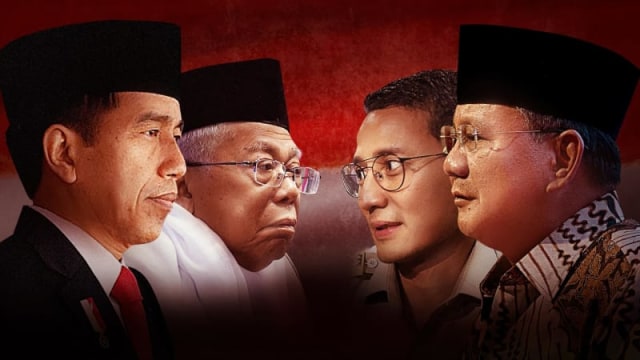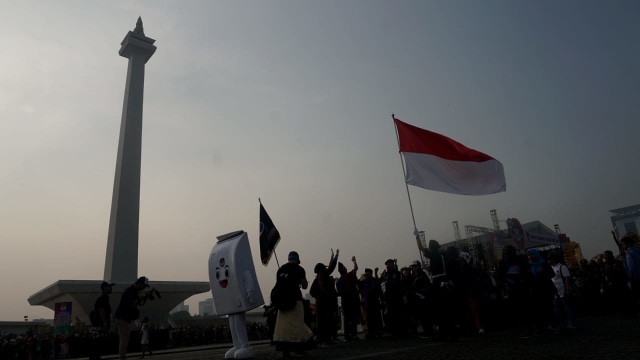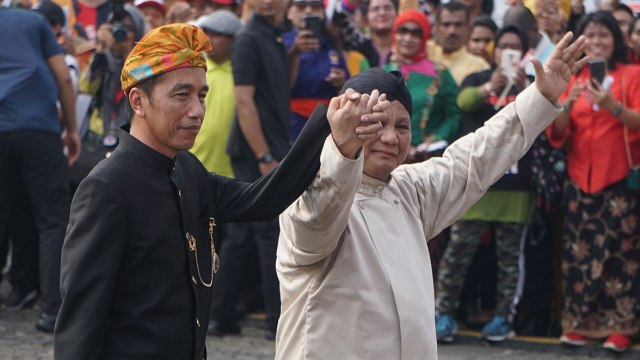The Battle of Programs In The Presidential Election Campaigns
Konten dari Pengguna
9 November 2018 18:03 WIB
Tulisan dari Gun Gun Heryanto tidak mewakili pandangan dari redaksi kumparan

ADVERTISEMENT
The campaigns for the upcoming presidential election is currently heating. Both pairs of president and vice president candidates are eagerly marketing themselves to the voter bases to gain more voice. Presidential campaigns, however, remain so typical from time to time. They focus mainly on the superficial surface issues while not touching the essence of national challenges. Even worse, the early stage of campaign period was polluted by hoaxes, propaganda, and personal attacks towards the opponents. A more significant contestation–the dialectics on proposed programs by both candidates, apparently, were less seen.
ADVERTISEMENT
Rational Approach
The campaign period from September 23, 2018 to April 13, 2019 should be perused as the contestation of ideas and programs such as economic development, legal advancement, better governance, international policies, and so forth. Instead, the campaign messages are currently going around sociological issues (e.g. primordialism and sectarianism) and also psychological issues (e.g. partisanship). Campaigns were lack of rational approaches, such as the overview of effective programs to overcome today’s challenges and the strategies that the candidates would take in the short, medium and long terms.
In their book entitled Persuasive Communication Campaign (1993), campaigns are defined as a process that is planned consciously, gradually, continously and is conducted within a period of time in order to influence the intended target audience.
ADVERTISEMENT
From the perspective of activity, there are three paths for winning the campaign. First, personal direction, it is about what and how candidates should move, say, and behave measurably and impactfully during the campaign period. Second, media recognition, this is related to efforts to promote candidates publicity in the review and discussion of mass media and social media. This is a part of resonating candidate figures to a wider audience. The position of the mass media is very important because the media can disseminate information about candidate profiles, ideas and programs simultaneously (one-to-many communication models).
More importantly, there is also a notable rise of social media influence for campaigns as it accomodates both one-to-many communication model and many-to-many communication model. Third, the management of communities and organisations that are close to the people. Building the spirit of solidarity and sense of belogingness amid the community and organizations is very important as it contributes to the acquisition of votes if managed properly.

From the target aspects of the winning plot, the campaign begins with the strong foundation and strengthening of the winning agents that will determine in the field. Next, campaigns involve increasing candidates’ popularity and familiarity to wider audience. The more candidates recognised and remembered by public, the easier it is for candidates and their teams to move towards voters.
ADVERTISEMENT
Third, increasing the public acceptability. It is concerning how candidates can be accepted and considered to be part of the voters. Finally, increasing the electability, this is related to the probability of getting candidates' votes in voter bases, especially in priority zones.
Program Indicators
In Leon Ostergaard's view, as quoted by Hans-Dieter Klingemann in Public Information Campaigns and Opinion Research (2002), there are at least three stages in program-based campaigns. First, identifying perceived factual problems. Campaign terms, must be issue/program-oriented, not merely image-oriented.
The campaign is the right momentum to show that the candidates understand various concrete, factual, elementary issues that need immediate handling in the society. It is no longer the time for the campaigns to only offer imaginary solutions that are abstract, lack of problem solving solutions.
ADVERTISEMENT
Secondly, campaign management should involve planning, doing and evaluation. Researches need to be undertaken to identify the characteristics of targeted audience hence the messages, campaign actors, campaign channels and techniques are modified accordingly. In this managing phase, the whole campaign content should be directed to equip and influence the knowledge, attitude and skills of targeted audience. These three aspects are richly discussed by a vast body of literature and are believed as the requirements for shaping voting behavior.
Campaigns cannot sufficiently rely on the sloganitic rhetorics, they should also base on the achievable and contestable indicators on the level of ideas and programs. In this way, voters are not merely presented with slogans, but also are invited to consolidate the democracy in Indonesia. Campaigns should be translated from the big elitist themes to the real world indicators.
ADVERTISEMENT
Thirdly, campaign evaluation should include reducing problems. In this case, evaluation is performed on the effectiveness of the campaign in addressing some issues identified in pre-campaign phase. Campaigns, therefore, are not a mechanism of false promises or public defamation; campaigns are a declaration of commitment to do the best possible acts by the candidates.
At the same time, campaigns are also ensuring many parties that candidates have some solutions in short, medium and long terms as a formula to reduce the issues amid the society. Should the president and vice president candidates are able to present their platforms and solutions for the nation issues, the public supports and sympathy will also be increasing.
ADVERTISEMENT
A substantial element to be maintained and upheld by all candidates is the integrity in campaigning. The competitive and heating atmosphere can easily trigger friction and polarisation among public. Therefore, a good political conduct and responsibility by all candidates is very much needed to uphold the moral and ethics of campaigns with integrity.
All candidates surely want to win, but all contestants should also maintain their political maturity to ensure the quality of the political process. There are at least three main indicators of campaigns with integrity.
ADVERTISEMENT
First, the chosen campaign strategies do not violate the principles of unity and solidarity. In the campaign season, the attempts to do character assassination, black campaigns, propaganda, and high detonate issues such as ethnical, religious, racial and partial issues would be so much higher. Attacking the opponents with verifiable facts and data is legitimate to do.
This endeavor is so called attacking campaigns which is classified by some literature as a negative campaign. What is not legitimate is black campaign which incorporates false news, rumours, hoaxes, let alone the sheepfighting strategies.

Second, the source of campaign fund is trustworthy and does not cause potential issues for the candidates in the future. Campaigns that are funded by personal and corporate ‘investors’ who have interests in some projects, local policies and elite circulation should be avoided.
ADVERTISEMENT
Third, the campaigns are not conducted in a pragmatic way by vote buying. This nirintegrated act is commonly found during campaign season. The money politic with its all kinds of camouflages are considered as normal, while it is actually breaking the democratic ethos thus the presidential election cannot produce a qualified leader.

